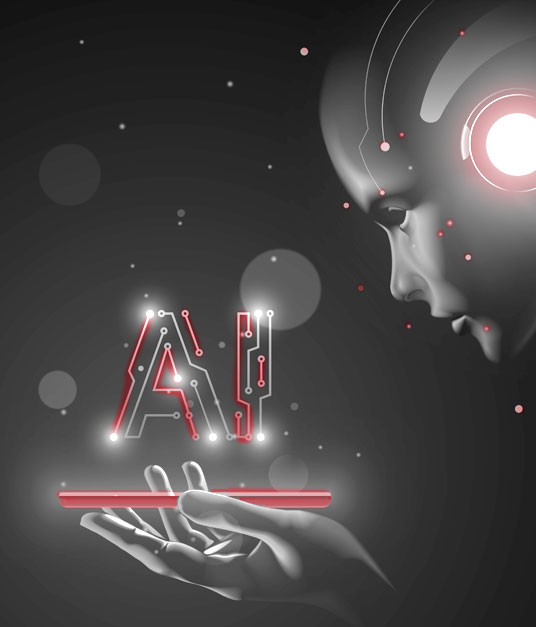

Back
 Artificial Intelligence (AI) is finding increasingly more applications, and its development is so dynamic that it might soon dominate many areas of human activity. What does its future hold? Will it lead us into another industrial revolution?
Artificial Intelligence (AI) is finding increasingly more applications, and its development is so dynamic that it might soon dominate many areas of human activity. What does its future hold? Will it lead us into another industrial revolution?
The dynamic development of artificial intelligence is such that it's difficult to encapsulate it within a single definition. Its nature and applications change with technological progress, and even within the IT expert community, various interpretations of AI can be encountered. Artificial intelligence can be perceived as a way to create systems capable of analyzing data, evaluating different situations, making choices among solutions, or even making decisions based on various criteria. It can also be understood as a tool for automating tasks that would require time-consuming human engagement. AI can aid in optimizing actions, minimizing errors, detecting threats, anomalies in network and system operations, and can analyze large volumes of data to extract the best patterns suited for individual situations and circumstances. So, what are the directions of AI development? What is and will AI be for humanity?
Artificial intelligence will continue to develop and find application in various fields such as medicine, industry, transportation, agriculture, finance, education, and more. It will play an increasingly larger role in process optimization, decision-making, disease diagnosis, task automation, and many other areas. There will be breakthroughs in machine learning, which as one of the primary areas of artificial intelligence, will continue to evolve. Breakthroughs are expected in machine learning algorithms, such as deep neural networks, which will enable even better data analysis, pattern recognition, and complex decision-making.
Artificial intelligence will be increasingly integrated with other technologies such as the Internet of Things (IoT), robotics, virtual and augmented reality (VR/AR), and blockchain. AI systems can already analyze data regarding production performance and quality, identify issues, and make real-time decisions. For instance, robots can employ AI algorithms for learning and adapting to changing production conditions, ensuring efficient and flexible manufacturing. AI can be used to analyze sensor data in IoT for predicting failures in production equipment. Machine learning algorithms can indicate the potential for failure, enabling preventive maintenance and minimizing machine downtime. Similarly, in detecting faulty components and products based on data from various sensors. AI in IoT can also support product personalization and adaptation to user preferences. Based on analysis of user preferences, behaviors, or habits, AI systems can adjust and respond to individual customer needs.
Undoubtedly, artificial intelligence is expected to enhance customer service quality in various business processes. AI-based chatbot systems can already provide real-time responses to customer inquiries, resolve issues, and offer support. Natural language processing algorithms allow for increasingly advanced customer interactions. However, the most powerful application of artificial intelligence can be seen in data analysis, trend identification, and forecasting.
Artificial intelligence holds great significance in business data analysis. Machine learning algorithms can process vast amounts of information, identify patterns, recognize correlations, and predict trends. This enables companies to make more informed decisions, manage risks, optimize operational processes, and forecast demand for products or services.
Routine, repetitive, and time-consuming tasks can be automated by AI systems, increasing operational efficiency and effectiveness. For example, automatic document classification and sorting, image recognition, or logistics process automation. Artificial intelligence can support risk management and fraud detection. AI algorithms are capable of analyzing extensive financial and transactional data to detect potential irregularities, anomalies, and fraudulent activities. This may encompass identifying payment fraud, internal abuses, or data breaches.
The mentioned areas and prospects are just selected examples of AI's further development directions. The technological synergy achieved through AI implementation can lead to the emergence of new innovative solutions and improvements in various fields. As artificial intelligence evolves, awareness of ethical and social issues related to its use will also increase. There will be a growing interest in ensuring responsible and secure AI utilization, encompassing privacy protection, algorithm fairness, and minimizing negative social impacts.
It should be noted that these predictions are general observations, and the development of artificial intelligence can be dynamic and hard to predict. The future of artificial intelligence will continue to be shaped by innovations, scientific research, and the evolution of social and business needs.
* The text was generated using tools utilizing artificial intelligence.
|
Secretary: +48 58 621 11 00 Mobile: +48 605 126 099 Fax: +48 58 621 10 30
|
|
E-mail:
|


